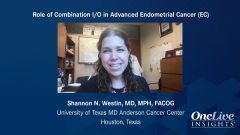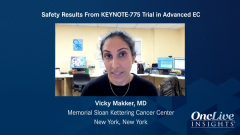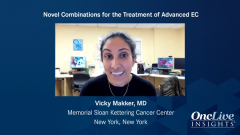
Emerging Data From Ongoing IO Combination Trials in EC
Shannon N. Westin, MD, MPH, FACOG, and Vicky Makker, MD, comment on data from ongoing clinical trials presented at the Society of Gynecologic Oncology 2021 Virtual Annual Meeting on Women’s Cancer for the management of advanced endometrial cancer.
Episodes in this series

Shannon N. Westin, MD, MPH, FACOG: A lot of exciting data were discussed at this year’s SGO [Society of Gynecologic Oncology] 2021 virtual annual meeting, including a number of trials in progress that are very relevant for this patient population. There are a number of ongoing studies that are exploring the treatment of patients with advanced and recurrent endometrial cancer. It has been pretty expansive, with some big all-comers studies. Some of the ongoing studies are looking at similar things. We’re looking again at combination strategies to get the best outcome. There’s a group of studies that are looking at chemotherapy with the addition of a checkpoint inhibitor in an all-comers population, but most of them are trying to tease out how much microsatellite instability drives the effect, the progression-free survival [PFS] end point.
I’m going to go through several of the studies ongoing in this space. The first is GY018, which is an NRG Oncology study that is exploring the addition of pembrolizumab to chemotherapy. Patients will be randomized to standard of care paclitaxel-carboplatin with or without pembrolizumab. They are allowing a population with microsatellite instability as well as microsatellite-stable disease, so they’ll tease out the impact on progression-free survival in both of those groups. Similarly, the RUBY study is exploring the same population, advanced or recurrent endometrial cancer, with the same backbone of paclitaxel and carboplatin. But in this case, patients are being randomized to either receive dostarlimab or not. It’s another checkpoint inhibitor in an all-comers population looking at that microsatellite instability-high [MSI-high] or microsatellite-stable group to see if the addition of the checkpoint inhibitor improves progression-free survival for this patient population.
There’s a third study—it’s a little bit of a crowded space—called DUO-E, and in full disclosure, I am the global principal investigator for that study. This study is similar but different in that it includes the same population of advanced and recurrent endometrial cancer. It does allow prior chemotherapy if it’s been more than 12 months since the patient had their last chemotherapy. It randomizes to that chemotherapy backbone with or without durvalumab, the PD-L1 inhibitor, and that’s given both with chemotherapy and as a maintenance. What’s a little bit different about DUO-E is that there’s a third arm in this trial, where at the time of maintenance, patients are also randomized to potentially receive olaparib, the PARP inhibitor. The goal of this study is to see if the addition of the checkpoint inhibitor, both with chemotherapy and maintenance, improves progression-free survival, but then also to see if that checkpoint inhibitor plus PARP inhibitor gives you better outcomes as a maintenance strategy. It’s to be determined if that adds more.
Finally, the AtTEnd study, again focuses on advanced and recurrent endometrial cancer, getting that chemotherapy backbone with or without atezolizumab in that population. Lots of patients are going on these trials. Fingers are crossed that we get good results, but what we see from those major trials is to be determined.
Vicky Makker, MD: There are a number of exciting immunotherapy [IO] and IO-oncology combination therapy trials ongoing that I think are noteworthy.
The EndoBARR study is an open-label, nonrandomized phase 2 trial combining VEGF monoclonal antibody bevacizumab, PD-L1 inhibitor atezolizumab, and PARP inhibitor rucaparib for the treatment of previously treated recurrent or progressive endometrial cancers. The combination of these 3 proposed agents offers an opportunity to explore the potential synergistic relationships between antiangiogenic and immunotherapy as well as antiangiogenic and PARP inhibitor combinations. This study allows all histotypes, including uterine carcinosarcomas. Patients are allowed to enroll if they’ve had up to 2 prior lines of therapy. For this trial, patients cannot have had prior bevacizumab, a PARP inhibitor, or immunotherapy, though they could have had prior exposure to an antiangiogenic agent that is not bevacizumab. Eligible patients are treated with atezolizumab and bevacizumab once every 3 weeks, and rucaparib is given twice daily on continuous dosing. The primary end point of the study is overall response rate. Secondary end points include PFS, OS [overall survival], and safety. This study is recruiting.
The next study I want to highlight is POD1UM-204. This is a nonrandomized phase 2 umbrella study that’s evaluating the safety and efficacy of anti–PD-1 monoclonal antibody retifanlimab alone or in combination with other therapies in patients with advanced or metastatic endometrial cancers who have progressed on prior platinum-based chemotherapy. Eligible patients for this study had to have at least 1 prior platinum-based regimen for advanced or metastatic disease. The retifanlimab will be administered as monotherapy or in combination with other immunotherapy or targeted therapy agents. There are number of groups in this study. Patients in groups A and B will not have had prior PD-1 or PD-L1 therapy. Patients in group A are going to be MSI-high. Those in group B will be MMR [mismatch repair]-deficient or POLE ultra-mutated. There is also a group that will have mutations in FGFR. Patients will receive retifanlimab, either by itself or in combination with an IDO inhibitor, or in combination with an agent called pemigatinib that is utilized in patients who have mutations in FGFR.
Essentially, the purpose of this trial is to understand whether a combination of immunotherapy, other immuno-oncology drugs, and targeted therapies in the appropriate population of patients will be efficacious. The primary end point of this study is objective response rate focused on group A. The secondary outcome measures for group A include duration of response, disease control rate, and overall survival. For the other groups, they are also looking at objective response rate. This study is also recruiting patients. There’s more to come with regard to hopefully preliminary data on this trial soon.
The next study is the AFT-50 EndoMAP study. This is a phase 1b/2 multicohort study that’s designed to evaluate the efficacy and safety of targeted agents plus immune checkpoint blockade therapy with atezolizumab in patients with advanced or recurrent endometrial cancer. This is a purely biomarker-driven study that provides a platform whereby patients with recurrent endometrial cancer will be placed into study cohorts that are evaluating PD-L1 inhibitor atezolizumab plus a targeted agent on the basis of a tumor-specific genomic profile. Patients will have FoundationOne testing to identity potential mutations and will then be categorized into various groups based on molecular profile that they may have. One group will receive treatment with atezolizumab and bevacizumab. These are patients who have no specific gene mutational signature. Then there will be a group that will be treated with atezolizumab and an AKT inhibitor called ipatasertib. The third group will be treated with atezolizumab and a PARP inhibitor called talazoparib. Essentially, 20 patients will be assigned to each cohort. This trial is not open to accrual yet, but hopefully will be in the near future.
Transcript Edited for Clarity











































